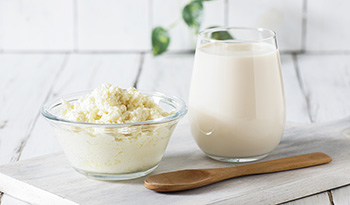15 abordări naturale ale fibromialgiei

Fibromialgia, denumită uneori sindromul fibromialgiei sau FMS, este un sindrom de durere cronică caracterizat prin dureri musculare, durere generalăși oboseală. Durerile musculare, numite mialgii, sunt de obicei difuze și resimțite în tot corpul. Fibromialgia afectează aproximativ 10 milioane de oameni din Statele Unite. La nivel mondial, peste 100 de milioane sunt afectate, dintre care nouăzeci la sută sunt femei. Studiile arată că 68% dintre cei cu fibromialgie au încercat suplimente nutritive pentru a ajuta la ameliorarea simptomelor lor.
Medicina convențională nu a descoperit încă cauza specifică a fibromialgiei. Mulți medici de medicină integrativă și funcțională cred că problema se află în mitocondrii sau în casele de energie ale celulelor noastre. Un raport de caz din 2011 al unui pacient cu o boală mitocondrială, care a fost inițial diagnosticat ca având fibromialgie, susține acest lucru.
În timp ce cauza fibromialgiei este considerată de mulți ca fiind necunoscută, se știe că pacienții afectați de FMS au cu 40% mai puțină coenzima Q10 în sânge și o activitate antioxidantă scăzută .
Cei cu FMS au, de asemenea, o cantitate scăzută de mitocondrii în celulele sanguine.Mitocondriile sunt părți ale celulelor noastre care ne oferă energie prin producerea moleculei de energie Adenozin Trifosfat (ATP). Alți cercetători au observat că o supraaglomerare bacteriană în intestinul subțire (cunoscută sub numele de SIBO sau supraaglomerarea bacteriană intestinală subțire) este prezentă la 90-100% dintre pacienții cu fibromialgie. Mulți experți cred că SIBO , intestinul cu scurgeri și producția scăzută de coenzimă Q10 pot fi implicate în cauza fibromialgiei.
Condiții asociate
Pacienții cu fibromialgie au frecvent alte afecțiuni asociate. Acestea includ migrenă dureri de cap, simptome ale intestinului iritabil (balonare, dureri abdominale, diaree și/sau constipație) și cistită interstițială. Somnul slab sau insomnia este, de asemenea, o plângere comună.
Fibromialgia Simptome
- Întregul corp durere
- Sensibilitate musculară și sensibilitate crescută la durere
- Oboseală
- Depresie
- Anxietate
- Sindromul intestinului iritabil
- Gut cu scurgeri
- Pofta de zahăr
Cum să ajuți la inversarea fibromialgiei
Detoxiază-ți corpul
În ultimii 100 de ani, mii de substanțe chimice au fost create de companii și aruncate în alimentarea cu apă, aer și chiar în mediul nostru de acasă. Cu multe dintre aceste substanțe chimice, încă nu avem aproape nicio idee despre modul în care ne afectează. Cu toate acestea, știm că multe au consecințe negative asupra sănătății, iar fibromialgia este probabil una dintre ele. Fiecare persoană are substanțe chimice toxice în corpul său - nu există nicio modalitate de a le evita complet. Cu toate acestea, putem încerca să minimizăm efectele pe termen lung ale expunerii la substanțe chimice. Detoxifierea organismului este crucială pentru întărirea corpului, astfel încât să se vindece. Aflați mai multe despre detoxifierea organismului.
Fixați-vă intestinul
Mulți cu fibromialgie au fost diagnosticați cu Sindromul intestinului iritabil (IBS). Dovezile sugerează că problemele gastro-intestinale pot fi de fapt cauza fibromialgiei și nu pur și simplu asociate. Studiile sugerează că sindromul intestinului cu scurgeri sau supraaglomerarea bacteriană intestinală subțire (SIBO) joacă un rol în fibromialgie. În 2004, Dr. Mark Pimentel a demonstrat în studiul său că pacienții cu mai multe bacterii rele în intestin au avut mai multe dureri asociate cu fibromialgia lor. Dr. Alex Vasquez a raportat, de asemenea, că proteina LPS (lipopolizaharidă) din aceste bacterii, atunci când este injectată într-o persoană, ar putea reproduce durerea pacienților cu fibromialgie.
Curățați-vă dieta
Evitarea alimentelor procesate este extrem de importantă în orice afecțiune cronică. Alimentele procesate conțin substanțe chimice străine organismului uman (xenobiotice) și au efecte asupra noastră pe care nu le înțelegem prea bine. Acestea includ conservanți alimentari și coloranți alimentari.
Consumul unei diete bogate în fructe și legume este un loc bun pentru a începe. Dacă este posibil, trebuie achiziționate fructe și legume fără pesticide (organice). De asemenea, consumați carne care este în principal hrănită cu iarbă, fără antibiotice și fără hormoni. Deși acest lucru poate fi mai scump în avans, există un potențial de economii de costuri dacă ajută la prevenirea afecțiunilor cronice de sănătate și îmbunătățește calitatea vieții cuiva.
Îndulcitorii artificiali și MSG ar trebui, de asemenea, evitați. Aspartamul (Nutrasweet) a fost raportat că induce nu numai dureri de cap migrene, dar este asociat cu alte probleme neurologice. Studiile au arătat o îmbunătățire a simptomelor fibromialgiei la cei care au fost sensibili la aspartam și MSG (glutamat monosodic) atunci când aceste substanțe chimice au fost eliminate din dietă .
Un studiu din 2017 realizat în Nutricion Hospitalaria a demonstrat că cei cu fibromialgie care au consumat o dietă scăzută de FODMAP au avut dureri reduse asociate cu fibromialgia. O dietă cu conținut scăzut de FODMAP poate ajuta frecvent la îmbunătățirea digestiei la cei cu IBS și intestin cu scurgeri.
Exercițiu
Exercițiile fizice s-au dovedit a fi utile pentru cei cu fibromialgie. Diverse studii au confirmat că exercițiile aerobice ajută la reducerea nivelului durerii, îmbunătățind în același timp capacitatea funcțională generală. Exercițiul ajută la îmbunătățirea sănătății mitocondriale.
Medicamente aprobate de FDA pentru fibromialgie
În opinia mea, utilizarea medicamentelor ar trebui să fie o ultimă soluție, numai după ce se fac suficiente modificări ale dietei și stilului de viață și se dovedesc insuficiente. Medicamentele nu sunt concepute pentru a „vindeca” fibromialgia, ci pentru a vă permite să trăiți confortabil în timp ce luați medicamentul la nesfârșit.
Fibromialgia Medicamentele aprobate de Administrația Federală a Medicamentelor (FDA) includ:
Duloxetină (Cymbalta) — 60 mg pe zi. Costul în SUA este de 320 USD pentru o aprovizionare de 1 lună
Pregabalin (Lyrica) — 150 mg până la 225 mg de două ori pe zi. Intervalul de costuri în SUA este de 415 USD până la 445 USD
Milnacipran (Savella) — 50 mg de două ori pe zi. Costul în SUA este de 397$
Alte medicamente aprobate de NON-FDA utilizate frecvent includ gabapentina, amitriptilina, fluoxetina. Aceste medicamente sunt generice și mai puțin costisitoare și prezintă beneficii similare.
Fibromialgia este frecvent tratată cu narcotice (opiacee), în ciuda faptului că nu există absolut nicio dovadă de beneficiu. Narcoticele pot fi de fapt mai dăunătoare și par să crească nivelul general al durerii pe termen lung. Opiaceele includ tramadol, fentanil, hidrocodonă, oxicodonă și morfină.
|
Potrivit Colegiului American de Reumatologie Deși nu este recomandat ca prim tratament, tramadolul poate fi utilizat pentru a trata durerea fibromialgiei. Acest analgezic este un narcotic opioid. Medicii nu sugerează utilizarea altor opioide pentru tratarea fibromialgiei. Acest lucru nu se datorează temerilor de dependență. Mai degrabă, dovezile sugerează că aceste medicamente nu sunt de mare beneficiu pentru majoritatea persoanelor cu fibromialgie. De fapt, ele pot provoca o sensibilitate mai mare la durere sau pot face durerea să persiste. ” |
Suplimente pentru fibromialgie
Diverse suplimente s-au dovedit a fi utile pentru ameliorarea simptomelor fibromialgiei. Mulți iau un supliment la un moment dat, nu observă o diferență, apoi încetează să o ia. Suplimentele pot avea un efect sinergic. Cei care au succes încep frecvent cu un supliment, adaugă un al doilea și poate un al treilea până când observă o îmbunătățire. Mai presus de toate, este important să vă concentrați asupra modificărilor dietei și stilului de viață, așa cum s-a discutat mai sus.
Vitamina D — Un simptom comun al deficitului de vitamina D este durerile musculare și durerile musculare. Studiile arată că cei cu fibromialgie au niveluri mai scăzute de vitamina D în comparație cu cei de control. Un studiu din 2017 în Reumatologie clinică a arătat că cei cu fibromialgie au avut mai puține dureri atunci când vitamina D. a fost înlocuită. Multe alte studii au arătat rezultate similare. Corectarea deficitului de vitamina D este crucială înainte de diagnosticarea fibromialgiei, deoarece vitamina D scăzută provoacă, de asemenea, dureri musculare. Doza sugerată: 2.000 UI- 5.000 UI zilnic. Aflați mai multe despre vitamina D.
Magneziu — Studiile arată că magneziul, un relaxant muscular natural, poate fi util la cei cu fibromialgie. Un studiu din 2013 în Rheumatology International a arătat că citratul de magneziu oral reduce durerea la cei cu fibromialgie. Mai mult, un studiu din 2015 în Journal of Integrative Medicine a demonstrat că atunci când clorura de magneziu a fost aplicată pe piele, a existat o reducere a durerii. Unele studii au arătat, de asemenea, că o combinație de magneziu și acid malic ar putea fi de ajutor. Magneziul este disponibil în capsule, spray-uri și formulări de loțiune . Doza orală recomandată: Chelat de magneziu 125 mg până la 500 mg sau conform indicațiilor de pe etichetă.
Melatonina —Melatonina este hormonul somnului secretat în fiecare noapte de glanda pineală. Acest hormon are beneficii antioxidante în plus față de promovarea somnului odihnitor. Un studiu din 2016 în Pain and Therapy a demonstrat că melatonina ar putea ajuta la reducerea durerii datorate fibromialgiei. Un studiu din 2015 a arătat beneficii similare. Doza sugerată: Melatonină 3 mg până la 10 mg în fiecare noapte.
Co-enzima Q10—Disfuncția mitocondrială este o teorie populară pentru cauza fibromialgieiși contribuie probabil la simptomele acesteia. Un studiu din 2012 efectuat pe PLOS ONE a demonstrat că pacienții cu fibromialgie au avut un nivel scăzut de coenzima Q10 și că suplimentele au ajutat la reducerea durerilor de cap la acești pacienți. Un studiu din Spania a constatat că femeile cu fibromialgie care au luat CoQ10 la o doză zilnică de 300 mg au observat o îmbunătățire a simptomelor lor. Doza recomandată: CoQ10 100 mg până la 300 mg zilnic
SAM-e—Există un studiu dublu-orb controlat cu placebodin 1991 care a arătat că SAM-e ar putea fi de ajutor la cei cu fibromialgie. Doza sugerată: SAM-e 800 mg pe zi.
Tiamina (vitamina B1)— Câteva studii au arătat beneficiul tiaminei pentru pacienții cu fibromialgie.În 2013, un studiu BMJ Case Reports a arătat ameliorarea simptomelor fibromialgiei atunci când administrarea de tiamină s a fost începută cu 300 mg pe zi și a crescut până la 1800 mg pe zi.
5-Hydroxytryptophan (5-HTP) - Un studiu din 1990 în Journal of International Medical Research a arătat că 5-HTP ar putea îmbunătăți simptomele fibromialgiei. Un studiu din 1992 a arătat beneficii similare. Doza sugerată: conform indicațiilor de pe etichetă.
L-carnitină - Acest supliment poate fi util și poate reduce simptomele legate de durere în sindromul fibromialgiei conform unui studiu din 2007. Doza sugerată: conform indicațiilor de pe etichetă.
Spirulina - Un mic studiu a arătat că spirulina poate fi utilă pentru reducerea simptomelorale fibromialgiei. Acest lucru se datorează probabil capacității sale prebiotice (hrană pentru bacteriile bune ale intestinelor) și capacității sale de a detoxifica organismul de toxine.
Uleiuri esențiale pentru fibromialgie
Uleiurile esențiale pot fi aplicate local pe mușchii și articulațiile dureroase. Uleiurile recomandate pentru fibromialgie includ tămâie, wintergreen, lavandă, rozmarin, cuișoare și mușețel. Aflați mai multe despre uleiuri esențiale și beneficiile lor.
Alte terapii alternative
Masajul, yoga, acupunctura, qigong-ul și medicina tradițională chineză (TCM) sunt alte căi terapeutice pe care cei cu fibromialgie le-au întreprins pentru a-și îmbunătăți calitatea vieții și ar trebui incluse în călătoria dvs. spre wellness.
Îți poți îmbunătăți simptomele fibromialgiei
În general, fibromialgia este o afecțiune foarte dificilă care provoacă suferință pentru mulți oameni. Cel mai important lucru este să restabiliți echilibrul și să căutați sănătate. Se recomandă evitarea alimentelor care înrăutățesc starea și consumul unei diete bogate în fructe și legume este, de asemenea, puternic încurajată. O dietă de eliminare ar putea fi, de asemenea, utilă - începeți prin eliminarea produselor lactate, a glutenului și a produselor pe bază de porumb. Narcoticele pot face o persoană să se simtă mai bine, dar pe termen lung, pot agrava durerea fibromialgiei. Studiile au dovedit că exercițiile fizice sunt utile, probabil datorită producției de mitocondrii suplimentare și capacității de a reduce inflamația cronică. Suplimentele pot fi, de asemenea, foarte utile. Luați în considerare să începeți mai întâi cu înlocuirea vitaminei D , apoi adăugați un supliment suplimentar la fiecare una până la două săptămâni până când simptomele se îmbunătățesc. Mănâncă sănătos, gândește-te sănătos și fii sănătos.
Referințe:
- Un sondaj pe internet a 2.596 de persoane cu fibromialgie. Bennett RM, Jones J, Turk DC, Russell IJ, Matallana L.BMC Disorder musculoschelet. 2007 9 martie; 8 (): 27.
- Abdullah M, Vishwanath S, Elbalkhi A, Ambrus JL. Miopatia mitocondrială prezentată ca fibromialgie: un raport de caz. Jurnalul rapoartelor de caz medicale. 2012; 6:55. doi: 10.1186/1752-1947-6-55.
- Cordero MD, De Miguel M, Moreno Fernández AM și colab. Disfuncția mitocondrială și activarea mitofagiei în celulele mononucleare din sânge ale pacienților cu fibromialgie: implicații în patogeneza bolii. Cercetarea și terapia artritei. 2010; 12 (1): R17. doi: 10.1186/ar2918.
- Pimentel M, Wallace D, Hallegua D și colab. O legătură între sindromul intestinului iritabil și fibromialgie poate fi legată de constatările privind testarea respirației lactulozei. Analele bolilor reumatice. 2004; 63 (4): 450-452. doi: 10.1136/ard.2003.011502.
- Vasquez A. Fibromialgia pe scurt: o strategie de medicină clinică sigură și eficientă Philadelphia, PA: BookBaby; 2012.
- Clin Exp Rheumatol. 2010 noiembrie-decembrie; 28 (6 Supliment 63): S131-3. Epub 2010 22 decembrie.
- Ann Pharmacother. 2001 iunie; 35 (6): 702-6.
- Nutr Hop. 2017 5 iunie; 34 (3): 667-674. doi: 10.20960/nh.703.
- Beneficiul exercițiului fizic în fibromialgie - Accesat la 2 decembrie 2017 http://www.cochrane.org/CD003786/MUSKEL_exercise-for-fibromyalgia
- Prețul medicamentelor eliberate pe bază de rețetă se bazează pe prețurile din decembrie 2017 de pe site-ul goodrx.com accesat pe 2 decembrie 2017 https://www.rheumatology.org/I-Am-A/Patient-Caregiver/Diseases-Conditions/Fibromyalgia
- Makrani AH, Afshari M, Ghajar M, Forooghi Z, Moosazadeh M. Vitamina D și fibromialgia: o meta-analiză. Jurnalul coreean al durerii. 2017; 30 (4): 250-257. doi: 10.3344/kjp.2017.30.4.250.
- Clin Rheumatol. 2017 decembrie; 36 (12): 2825-2833. doi: 10.1007/s10067-017-3754-y. Epub 2017 15 august.
- Rheumatol Int. 2013 ianuarie; 33 (1): 167-72. doi: 10.1007/s00296-011-2334-8. Epub 2012 22 ianuarie.
- J Integr Med. 2015 septembrie; 13 (5) :306-13. doi: 10.1016/S2095-4964 (15) 60195-9.
- Danilov A, Kurganova J. Melatonina în sindroamele durerii cronice. Durere și terapie. 2016; 5 (1): 1-17. doi: 10.1007/s40122-016-0049-y.
- De Zanette SA, Vercelino R, Laste G și colab. Analgezia melatoninei este asociată cu îmbunătățirea sistemului descendent endogen de modulare a durerii în fibromialgie: un studiu de fază II, randomizat, dublu manechin, controlat. Farmacologie și toxicologie BMC. 2014; 15:40. doi: 10.1186/2050-6511-15-40.
- Mitocondrie. 2011 iulie; 11 (4): 623-5. doi: 10.1016/j.mito.2011.03.122. Epub 2011 7 aprilie.
- Cordero MD, Cano-Garcia FJ, Alcocer-Gomez E, De Miguel M, Sanchez-Alcazar JA. Stresul oxidativ se corelează cu simptomele durerii de cap în fibromialgie: Coenzima Q10 Efect asupra îmbunătățirii clinice. Mendelson JE, ed. PLoS ONE. 2012; 7 (4): e35677. doi: 10.1371/journal.pone.0035677.
- Alcocer-Gómez, E., Culic, O., Navarro-Pando, JM, Sánchez-Alcázar, J. A. și Bullón, P. (2017), Efectul coenzimei Q10 asupra simptomelor psihopatologice la pacienții cu fibromialgie. CNS Neuroscience Ther, 23:188—189. doi: 10.1111/cns.12668
- Scand J Rheumatol. 1991; 20 (4): 294-302.
- Costantini A, Pala MI, Tundo S, Matteucci P. Doza mare de tiamină îmbunătățește simptomele fibromialgiei. Rapoarte de caz BMJ. 2013; 2013:bcr2013009019. doi: 10.1136/bcr-2013-009019.
- J Int Med Res. 1990 mai-iunie; 18 (3): 201-9.
- J Int Med Res. 1992 aprilie; 20 (2): 182-9.
- Rossini M, Di Munno O, Valentini G, Bianchi G, Biasi G, Cacace E, Malesci D, La Montagna G, Viapiana O, Adami S. Studiu dublu-orb, multicentric care compară acetil l-carnitina cu placebo în tratamentul pacienților cu fibromialgie. Clin Exp Rheumatol. 2007; 25:182-188.
- Comerciant RE, Andre CA. O revizuire a studiilor clinice recente ale suplimentului nutritiv Chlorella pyrenoidosa în tratamentul fibromialgiei, hipertensiunii și colitei ulcerative. Altern Ther Health Med. 2001; 7:79-80, 82-91.
- Sawynok J, Lynch ME. Qigong și fibromialgia circa 2017. Liu W, Litscher G, eds. Medicamente. 2017; 4 (2) :37. doi: 10.3390/medicamente4020037.
- Cao H, Liu J, Lewith GT. Medicina tradițională chineză pentru tratamentul fibromialgiei: o revizuire sistematică a studiilor controlate randomizate. Jurnalul de Medicină Alternativă și Complementară. 2010; 16 (4): 397-409. doi: 10.1089/acm.2009.0599.
Declarație de declinare a responsabilității:Acest blog nu are ca scop să ofere un diagnostic.














































































 Cuprins
Cuprins















